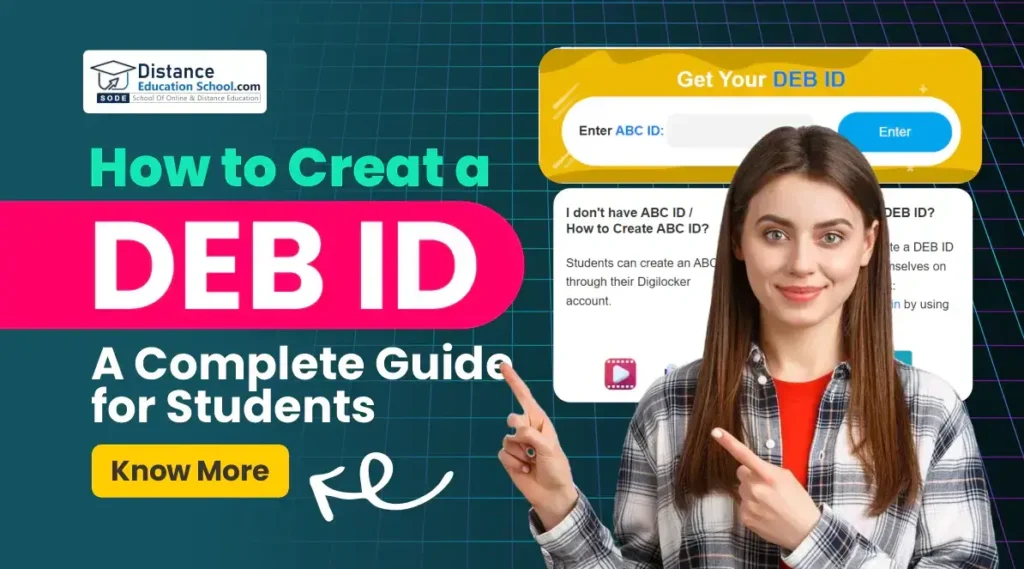
How to Create a DEB ID - A Complete Guide for Students
Distance and online education are becoming more important in India’s higher education system. To ensure quality and consistency in this education, various rules and guidelines have been established. The Distance Education Bureau (DEB), established in 2012, is responsible for regulating and promoting distance, open, and online education in India. As part of its efforts to enhance accountability, the DEB introduced the DEB ID, a unique identifier to ensure students enroll only in recognized and accredited programs.
DEB replaced the earlier Distance Education Accrediting Commission (DEAC) to create a more robust framework for quality assurance in education.
Online/Distance MBA Universities In Other Cities
What is a DEB ID?
The DEB introduced the concept of a DEB ID, a unique identifier mandatory for students enrolling in distance education programs. This ID acts as a safeguard, ensuring students only enroll in recognized and accredited courses while protecting them from fraudulent institutions. By streamlining the admission process, the DEB ID enhances transparency and accountability in distance learning.
A DEB ID is a mandatory unique identifier that learners must create to enroll in Open and Distance Learning (ODL) or Online Programs. Its purpose is to ensure students are admitted to programs offered by Higher Educational Institutions (HEIs) recognized by the Commission.
The Role of ABC ID
What it is: It’s a unique 12-digit code assigned to students in India under the Academic Bank of Credits scheme, a key initiative of the National Education Policy (NEP) 2020.
Purpose: The ABC ID acts as a central hub for a student’s academic journey, allowing them to:
- Store and manage academic credits: Accumulate credits earned from various higher education institutions.
- Transfer credits: Seamlessly transfer credits between different institutions, providing flexibility in their educational path.
- Access and verify academic records: Maintain a digital record of their academic achievements, including certificates, diplomas, degrees, and co-curricular activities.
Benefits:
- Increased flexibility and mobility: Students can move between institutions more easily, pursuing their education in a more personalized and flexible manner.
- Improved credit recognition: Facilitates the recognition and acceptance of credits earned across different institutions, both within India and potentially internationally.
- Enhanced employability: A comprehensive and verifiable record of academic achievements can enhance a student’s employability prospects.
Step-by-Step Guide to Creating a DEB ID
Creating a DEB ID is a simple yet essential process for enrolling in recognized Open and Distance Learning (ODL) or Online Programs. Follow this step-by-step guide to generate your DEB ID seamlessly:
Create an ABC ID: Register for an ABC ID via Digilocker by providing your personal and academic details.
Visit the UGC-DEB Official Website: Navigate to the official UGC-DEB website to continue the DEB ID registration process.
Register for DEB ID: Enter your ABC ID on the DEB website to generate your DEB ID. This ID will be crucial for your admissions into various online and distance learning programs.
Why is DEB ID Important for Students
A DEB ID (likely referring to a Digital Education Board ID) is crucial for students pursuing distance or online education in India. A DEB ID adds a layer of credibility and assurance to a student’s academic journey, making their distance or online education more valuable and recognized in the academic and professional world. It serves as a unique identifier linked to their academic records, ensuring the authenticity and credibility of their educational credentials.
Here’s why it’s important:
Quality Assurance: A DEB ID indicates that the student is enrolled in a program recognized and approved by the Distance Education Bureau (DEB) of the University Grants Commission (UGC). This ensures that the program meets quality standards and provides a valuable learning experience.
Authenticity and Recognition: A DEB ID helps validate the authenticity of the student’s degree or diploma, making it easier for employers and other institutions to recognize and accept their qualifications.
Access to Resources: A DEB ID may provide students with access to various online resources, learning platforms, and support services offered by their institution or the DEB itself.
Protection of Student Interests: By regulating distance education and ensuring quality, the DEB ID indirectly helps protect students’ interests by minimizing the risk of enrolling in fraudulent or substandard programs.
What is UGC-DEB
UGC-DEB is the division within the University Grants Commission (UGC) in India that is specifically responsible for overseeing and regulating distance and online education programs offered by higher education institutions in the country.
The Distance Education Bureau (DEB) plays a vital role in regulating and promoting distance and online education in India. It sets quality standards, approves and accredits institutions and programs, and ensures their adherence to established norms.
By expanding access to flexible learning modes, the DEB promotes equity and makes higher education more accessible to individuals facing geographical or other barriers. DEB UGC coordinates the growth of distance education by encouraging innovation and best practices while safeguarding student interests through grievance redressal and fair academic practices.
Objectives of the Distance Education Bureau (DEB)
The Distance Education Bureau (DEB) plays an important role in ensuring the quality and accessibility of distance education across India. It aims to regulate, promote, and enhance the standards of education offered through the Open and Distance Learning (ODL) mode. Below are the key objectives of the DEB that guide its functioning:
| Aspect | Details |
|---|---|
| Ensure Quality in Distance Education | To set and enforce standards for the quality of distance and online education programs offered by institutions. To ensure that these programs meet academic rigor and provide a valuable learning experience for students. |
| Regulate and Accredit Institutions | To grant approval to institutions to offer distance and online programs. To accredit programs based on their quality, curriculum, faculty, and infrastructure. |
| Promote Access and Equity | To expand access to higher education by enabling students to pursue studies through flexible and distance learning modes. To promote equity by making quality education accessible to individuals who may face geographical or other barriers to traditional on-campus learning. |
| Coordinate and Facilitate Growth | To coordinate and facilitate the growth of distance and online education in India. To promote innovation and best practices in this field. |
| Protect Students Interests | To safeguard the interests of students enrolled in distance and online programs. To address student grievances and ensure fair and transparent academic practices. |
Benefits of Distance/Online Education
Distance and online education offers a range of advantages that cater to the needs of modern learners. As technology evolves, these flexible learning options provide opportunities for personal and professional growth. Here are some key benefits of distance and online education:
Flexibility: Students can learn at their own pace and schedule, making it easier to balance work, family, and education. This way, they can create the best learning routine for them.
Accessibility: Online education allows access to many courses and resources from anywhere, breaking down location barriers. Students living in remote areas can still find good educational opportunities.
Cost-Effective: Distance learning often saves money on travel, housing, and books, making it more affordable. This helps more people access higher education without financial stress.
Diverse Learning Options: Many online courses are available that cater to different interests and career goals. This variety encourages students to keep learning and develop new skills.
Self-Discipline and Time Management: Students learn to stay motivated and manage their time better as they take charge of their studies. These skills are useful not only in school but also in jobs.
Technology Skills: Online education helps students improve their computer skills, which are important for today’s jobs. Being comfortable with technology can help them find better job opportunities.
Personalized Learning: Students can choose how they learn and what resources they use, which suits their needs. This helps them connect better with the material they study.
Global Networking: Online programs connect students with classmates and teachers worldwide. This exposure to different ideas can make learning more interesting and valuable.
Conclusion
The DEB ID facilitates your educational pursuits in distance learning and ensures that you are part of a system that values quality and integrity. By following the steps outlined above and choosing recognized programs, students can effectively navigate their educational journeys in the digital age.
This blog provides a detailed guide to obtaining and understanding the significance of a DEB ID, ensuring that students can make informed decisions about their distance education choices.
Most Popular Blogs

Online BCA Courses in Jain University Online

Distance Education at Pondicherry University

Top 4 colleges to pursue Distance BBA in Andhra Pradesh

What are the top distance BSc colleges in Kerala

Know about the top 3 distance BCom universities in Madhya Pradesh



















